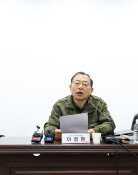Corporate tax cut should be reviewed from perspective of ‘national interest’
Corporate tax cut should be reviewed from perspective of ‘national interest’
Posted December. 14, 2022 07:58,
Updated December. 16, 2022 15:22
Despite the fact that the ruling and opposition parties decided to pass next year's budget on Thursday beyond the regular session of the National Assembly, they are unable to make headway due to a sharp difference in opinion on corporate tax cuts. Rather, the situation is exacerbated at best. It seems to have turned into a battle of philosophies and ideologies of the new and old powers, and furthermore, power struggles beyond anything related to legislation.
The government and the ruling party criticize that “even though the administration has changed, the politicians who were in power in the past insist that the government be run with the same values and ideologies.” The major opposition Democratic Party presses, "Corporate tax cut is for the ultra-rich that cannot be conceded. Give up trying to pass the bill." President Yoon Suk Yeol said candidly, “Corporate tax cut is not just for large corporations. This must pass to boost economic vitality.” However, the Democratic Party countered, saying, “We would rather have the president negotiate directly with the National Assembly and deal with the issue.”
The government and the ruling party propose to lower the maximum corporate tax rate from 25% to 22%. Its rationale is to induce investment in high-tech industries, including semiconductors, by lowering corporate tax, which ranks seventh among the 38 member countries of the Organization for Economic Cooperation and Development (OECD). Taiwan's highest corporate tax rate is 20%. The corporate tax rate gap between Korea and Taiwan is 7.5 percentage points if local taxes are considered. The difference in tax burden is large, which inevitably limits investment. The Democratic Party insists that when the tax burden is reduced, only chaebol families benefit from dividends, so it is a “tax cut for the ultra-wealthy.” However, corporate tax cut can lead to a virtuous cycle throughout the economy by expanding investment, creating jobs, and increasing dividends to minority shareholders.
It is undesirable to look at the debate between the government, the ruling party and the opposition party over corporate tax cut only from the perspective of “political sense” rather than “economic sense.” Due to the U.S.-China competition, global investors are leaving China to seek new investments. Investment attraction is desperately needed to offset crises such as the rapidly growing trade deficit. Despite the context of the corporate tax cut proposal, it is only myopic to see it as a political framework, such as claiming that it is a tax cut for the ultra-rich.
Therefore, it is time to consider the national interest as a priority, put economic logic in mind, and find an answer to the corporate tax cut issue. We need to know exactly why the six economic organizations are issuing statements calling for corporate tax cut every day, saying, “We cannot use the knife we use when we are safe during times of war.” The Korea Federation of SMEs and the Federation of Middle Market Enterprises of Korea also participated in this statement. The Korean economy is in a desperate situation where it is expected that the economic growth rate will drop by 1% next year, and low growth will continue into the next year. Now is not the time to think about the political party's identity or ideology. We hope that the government and the ruling party will hurry up to devise a plan that will lead to a comprehensive agreement before the budget deadline rather than dwelling on confrontation with the opposition party.







